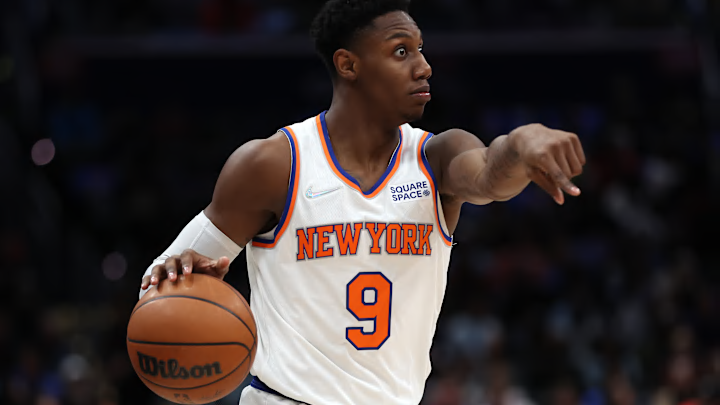How does the Knicks overpay affect the Rockets and Kevin Porter Jr?
If Kevin Porter Jr. and the Rockets were far apart on extension negotiations, that gap only widened in light of the RJ Barrett extension. As noted before, Porter and Barrett are very similar players in terms of production. The shape of their production differs, and Barrett has been on significantly better teams, but, at the end of the day, they both should receive similar extensions based on their NBA production.
Earlier in the offseason, I broke down what I thought Porter should earn in an extension using a similar methodology to the one I used to analyze Barrett’s new deal. You can check it out if you want the full monty, but the conclusion was Porter should land a contract in the $11 million to $14 million per year range for three or four years. Barrett nearly tripled the low end and more than doubled the high end of those figures.
However, that shouldn’t change the Rockets’ thinking. If Porter believes he is a $20 million or more per season player, not completely unreasonable based on what Barrett secured, then the Rockets should just wait. If Porter is right and takes a star turn this season, the Rockets can slap a qualifying offer on him, send him out into restricted free agency, and match any offer to retain him.
On the flip side, if Porter produces at a similar rate as he did last season, then the Rockets can offer him a deal closer to $11 million or $14 million per year, and if that doesn’t work, they can still match any offer sheet. The only risk the Rockets run is they end up paying Porter what he is worth.
The ramifications of the RJ Barrett extension for the Rockets and Kevin Porter Jr. is that it makes an extension this offseason far less likely. If an agreement couldn’t be made earlier in the offseason, it’s because Porter felt he should land a larger investment than the Rockets were willing to make. Even if Barrett’s deal doesn’t widen that gap, it certainly doesn’t shrink it.
Barrett’s contract is unlikely to have consequences past this offseason. It’s a clear overpay and shouldn’t reset the market. Barrett, while an equal of Porter’s, is perceived as a better prospect due to his draft pedigree. If he hadn’t been taken with the third overall pick, he wouldn’t come close to sniffing $100 million.
The Knicks made a bet on a player drafted highly because players drafted in the top five are more likely to be good NBA players, but that doesn’t make it a guarantee. After all, good NBA players are the most likely to be good NBA players, and Barrett has yet to hit that benchmark.
Porter, as the 30th overall pick, can’t lean on his draft pedigree to suggest a massive breakout to justify an overpay. Is that fair? Absolutely not, but that’s unfortunately how the NBA works. The best way to get overpaid in the NBA is to be a mediocre top-five pick or be a Klutch client on a LeBron’s team.
In light of Barrett’s extension, the Rockets should stick to their price, and Porter should increase his. While this doesn’t help come to any resolution, it is the best decision for both parties. Porter should bet on himself because the upside just grew, and the Rockets should wait and see if it pays off. Patience is a virtue, and while the Knicks clearly don’t think so, the Rockets have two decades of evidence to suggest that following the Knicks' lead is rarely a winning strategy.
